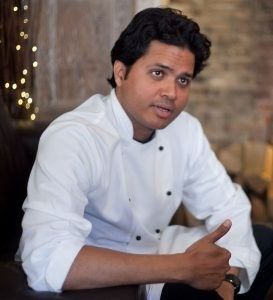VARIETY is the spice of life, as the saying goes, and the restaurant sector is embracing this with new fusion cuisines and combinations.
Palmito, an Ecuadorean-Indian restaurant in Brighton, Sussex, is among the businesses earning rave reviews with dishes such as grilled squid in a Keralan roast style sauce, and lamb chops with chickpea and spinach masala and salsa macha.
Another fusion hit has been Italian-Indian pizza eatery East West in north London.
And chefs believe the industry is become more creative with ingredients and dishes to curry favour with diners, amid growing competition and the cost of living crisis.
Dev Biswal, owner of The Cook’s Tale restaurant in Canterbury, Kent, said he has featured ceviche, a Latin American fish dish, with chaat masala in an Indian twist in his menus.
He told Eastern Eye: “I have also done lasagne with minced lamb and nutmeg for my lunch menus.
“Recently, we did a fusion threecourse northern Italian menu matched with wines from the Tuscan region.”
The chef added that south Asian food as it is eaten today is a result of influences from a multitude of other cuisines.
“We didn’t know until recently that even chillis are not native to the Indian subcontinent. They were introduced by the Portuguese in the 15th century. Prior to that, the main sources of heat in Indian food were black pepper and stem pepper (piper chaba).
“I have brought some over from my last foodie trip to India and it is quite an interesting flavour.”
Another new restaurant with a unique concept is Empire Empire in west London, which opened in June. It is a mix of Indian food and disco music with a focus on the 1970s music scene in the south Asian country.

Ruhul Tarafder, who runs takeaway Jhal Chilli in Kent, previously owned a restaurant in London. He said eatery owners and chefs are b e c o m i n g more adventurous due to the struggles that businesses, mainly outside London, are facing.
Tarafder said: “They are trying all kinds of things. A customer of mine runs Tuk Tuk, offering pan-Asian Indian, Thai and Indonesian cuisine which is doing quite well. They have a chain all over the UK, in Surrey, Essex.
“Some are trying fusion. My cousins used to offer British Thai food in Southampton.
“Vegan fusion is also a new market that is doing well.”
He added: “People are having to be creative. It used to be Indo-Chinese at one time, as a result of JustEat and the other apps. Anyone can sell on it.
“Before, you had to spend money on marketing and building a brand, now you just go on an app. I would consider doing sushi and bubble tea and trying new things. We have the space and the site.
“In Brick Lane, a lot of fusion places have opened offering new cuisine. I’ve heard it is picking up.”
Cyrus Todiwala is a chef and author who owns restaurants including Cafe Spice Namaste in Gallions Reach, east London.
He believes eateries in the east of the capital are not getting the attention of restaurant critics.
Todiwala said: “We use a lot of Italian produce, for example, and we do quite a bit of marriage with the Portuguese element of Goan food.
“Also, being classically French trained, we use several French products as well as techniques at times, which hold good and add a different element to the cooking.
“The problem we face is that none of the famous food critics venture to the east end of London to review [our restaurants].
“All of them have an issue, and some have openly told me that ‘we don’t go east’.
“Therefore, the West End always gets the reviews and no one gets to know about people like us or our food, our cuisine, and what we offer,” Todiwala explained.
George Shaw, chairman of judges for the Asian Catering Federation industry group which represents more than 5,000 restaurants in the UK, believes Indian food has “fusion at its very soul”.
He said: “Indian cuisine is rich and varied – with widely different uses of ingredients and techniques through the subcontinent.”
Shaw went on: “It is constantly evolving – never static.
“No understanding of India’s history is possible without being aware of the food, from the days of the Alexander the Great, Mughal conquerors, the French colonialists, the Portuguese bringing potatoes, tomatoes and chillis from the Americas, through to the days of the British Raj.
“The trading route of the Grand Trunk Road brought exotic spices from the East. Mumbai had its own long-established China Town.”

